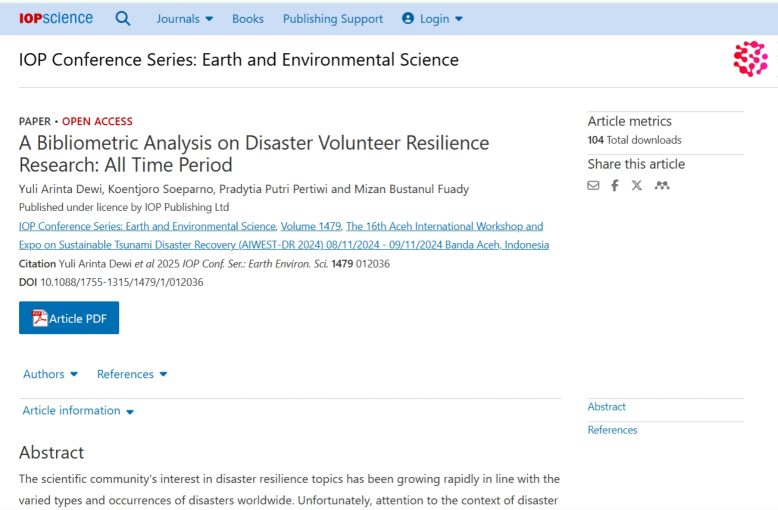
Yogyakarta, May 5, 2025 — A recent study titled “A bibliometric analysis on disaster volunteer resilience research: All time period”, published in the Scopus-indexed proceedings IOP Conference Series: Earth and Environmental Science 1479 012036, reveals global trends, collaborations, and key focuses in disaster volunteer resilience research.
Authored by Yuli Arinta Dewi, Koentjoro Soeparno, Pradytia Putri Pertiwi, and Mizan Bustanul Fuady, the research employs a bibliometric approach to analyze scientific literature over time. The findings show a significant increase in studies on resilience in the context of disaster volunteers, reflecting the growing need for community participation in disaster response. This study offers valuable insights for policymakers, researchers, and humanitarian practitioners, particularly in designing evidence-based training and policies to strengthen community resilience through volunteer roles.
Below are the abstract, keywords, and article link:
Abstract
The scientific community’s interest in disaster resilience topics has been growing rapidly in line with the varied types and occurrences of disasters worldwide. Unfortunately, attention to the context of disaster volunteers is limited. Existing humanitarian and disaster relief personnel interventions are more reactive/curative than preventive. This study examines the scientific literature written by international authors, focusing on disaster topics related to volunteer resilience in all periods. The article was published from 1969 to 2024 using a bibliometric study employing a database from Scopus. This study utilized VOS viewer version 1.6.19 to visualize the results. The research results showed that the articles used as references amounted to 590 papers discussing disaster volunteer resilience. The results showed that the most significant expansion in research occurred in 2004, and the United States was identified as the most productive nation in this field. Affective Disorders, followed by Psychological Trauma: Theory, Research, Practice, and Policy, were found to be the most recognized journals in this area. VOS viewer analysis identified four main clusters representing subtopics in this topic, with keyword volunteers not associated with the resilience phrase and being in a different cluster. This study contributes to the literature on disaster volunteer resilience mainly by providing a comprehensive overview of research trends and identifying gaps for future inquiry. Future research could explore the contextual factors influencing volunteer resilience and recommend further research in Indonesia, a disaster-prone area.
Keywords: bibliometric study; disaster; resilience; volunteer; VOS viewer
The article is available online at: https://doi.org/10.1088/1755-1315/1479/1/012036
Based on its keywords, this article contributes to research supporting the following SDGs: 3 (Good Health and Well-being), 11 (Sustainable Cities and Communities), 13 (Climate Action), and 17 (Partnerships for the Goals).
Congratulations to Ms. Dytia and the writing team!
Writer & Editor: UP & Public Relations Team
